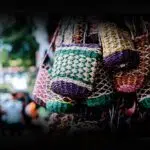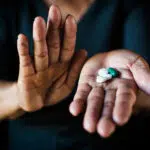You may not hear about these terms as much today as in years past, but HIV/AIDS is still wreaking havoc in the African-American community. If you are African-American, National Black HIV/AIDS Awareness Day (NBHAAD) offers the latest updates on the fight against the infection and the disease. NBHAAD occurs every February 7 with inspirational stories of survivors, suggestions on how to make healthier, more positive lifestyle choices, and details on the latest innovations in education and treatment. NBHAAD speaks to the resilient spirit of strength, faith, and hope in the black community.
National Black HIV/AIDS Awareness Day timeline
The tennis great revealed he developed AIDS after contracting HIV from tainted blood during heart surgery years earlier.
HIV was the leading cause of death for black women aged 24-34, and the third leading cause of death for ages 35-44.
According to CDC end-of-year projections, just under half of all U.S. citizens living with HIV were African-American.
The Obama Administration announced an ambitious initiative to curb the HIV/AIDS epidemic.
The FDA approved the OraQuick In-Home HIV test - with results in 20 to 40 minutes.
How to Observe National Black HIV/AIDS Awareness Day
Get tested
In July 2006, on the opening day of the NAACP convention, Chairman Julian Bond tested publicly for HIV. This sent a message to the black community about the importance of getting tested. If you have never been tested, follow that lead and commit to taking this step. Buy a home-testing kit either online or at a drugstore. While you're at it, test for other sexually transmitted diseases.
Use a condom — every time
One of the biggest dangers in spreading HIV/AIDS is practicing risky behaviors like unprotected sex — no matter your sexual orientation.
Remember a loved one
It's a time to remember those currently living with HIV or AIDS, and especially to honor those who have died from the disease. Attend a candlelight vigil at a church or a program at a community center. Put fresh flowers on your loved one's grave. Or sit quietly in front of the small shrine you may have at home and lovingly remember the good times you shared with your friend, partner, spouse, or relative.
5 Things To Know About HIV/AIDS
It's a relentless virus
HIV can live in a used needle for up to 42 days depending on the needle's environment, temperature, and other factors.
It once had a different name
The original acronym for AIDS was GRID, Gay-Related Immune Deficiency, which was first mentioned in a “New York Times” article in 1982.
It affects women with a history of sexual abuse
Sexually-abused women may be more likely to engage in risky sexual behaviors such as exchanging sex for drugs, having multiple partners, or practicing unprotected sex.
HIV doesn't automatically turn into AIDS
Thanks to potent new drugs, many HIV-positive people never develop AIDS.
It's covered under the Affordable Care Act
The ACA provides free or low-cost coverage for treatment and medications to low-income HIV-positive patients under Medicaid expansion.
Why National Black HIV/AIDS Awareness Day is Important
It’s part of an effective grassroots effort
National Black HIV/AIDS Awareness Day (NBHAAD) is part of a major offensive against HIV/AIDS spreading in the African-American community — and by all accounts it's working. Still, despite increased education efforts and a continued push for testing and treatment options, there are 471,500 African-Americans living with HIV, according to the CDC. However, the number of newly-infected people is declining or leveling off. After 18 years of persistent grassroots efforts to forge partnerships in funding research, National Black HIV/AIDS Awareness Day still matters because it keeps the conversation going not only in the black community, but in all communities.
You can be easily infected
In 2016 African-Americans accounted for 44 percent of HIV diagnoses despite being only 12 percent of the U.S. population. In fact, you can live with HIV for years without realizing it. There are several risky behaviors for passing on the virus including engaging in unprotected sex with an HIV-positive person or sharing needles and syringes.
African-American women struggle with HIV/AIDS
African-American women have benefited from increased education and treatment in the fight against HIV/AIDS. But in 2016 the CDC reported that over 7,000 women were newly diagnosed. Many of these women were infected through heterosexual contact because women who are married, or in otherwise monogamous relationships, may feel "safe" without using condoms.
National Black HIV/AIDS Awareness Day dates
| Year | Date | Day |
|---|---|---|
| 2025 | February 7 | Friday |
| 2026 | February 7 | Saturday |
| 2027 | February 7 | Sunday |
| 2028 | February 7 | Monday |
| 2029 | February 7 | Wednesday |



























